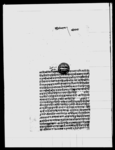A lālamohara from King Raṇabahādura informing Dalamardana Śāha et al. of his father's death and the satī of eight slave girls (VS 1834)
ID: DNA_0014_0041
Edited and
translated by Axel Michaels
in collaboration with
Rajan Khatiwoda
Created: 2016-09-23;
Last modified: 2018-06-23
For the metadata of the document, click here
The accompanying edition, translation/synopsis and/or commentary are available under the terms of the Creative Commons Attribution-ShareAlike 4.0 International License
Abstract
King Raṇabahādura Śāha writes this letter to Prince Dalamardana Śāha and Bahādura Śāha to inform them about the demise of the king's father on Monday morning, the sixth day of Maṅgsira. The letter also mentions the immolation (satī) of eight female slaves (keṭī).Diplomatic edition
[1r]
श्रीदुर्गासहायः\श्रीवावा[Royal Seal]1स्वस्तिश्रीगिरिराजचक्रचूडामणिनरनारायेणेत्यादिवि2विधविरूदावलिविराजमानमानोन्नतश्रीमन्महाराजाधि
3राजश्रीश्रीश्रीमहाराजेरणवहादूर्साहवहादूर्समसेर्ज
4ङ्देवानाम्सदासमरविजयिनाम्•लि•स्वस्तिश्रीगि
5रिराजचक्रचूडामणिनरनारायणेत्यादिविविधविरू
6दावलिविराजमानमानोन्नतश्रीमन्महाराजाधिराजकु
7मारश्रीश्रीश्रीमद्दलमर्दनसाहदेवेषुतथाश्रीश्रीश्री
8मद्वहादूर्साहदेवेषुसदासमरविजयिषु•¯ ¯ ¯पूर्वक•
9पत्रम्इदं•इहाँकुसलताँहाँकुसलचाहिये•आगेइहाको
10समाचारभलोछ•उप्रांत•अघिदेषि¯ ¯ ¯ज्युलाइ•र
11गत्पर्न्यावेथाथियो•पछिवातकोवेथाथपियो•वेथा
12कोदवाउभयोरमंसिरकादिन६जाँदो•सोमवारविहा
13नपर्लोगहुनुभयो•जना८केटिहरुसतिगया•क्रिया
14कर्मगर्नलाग्युक्रियावस्याका•नरुसाह•सिवसाह•भो
15टुपाँडे•नीलधोज•भवानिदत्त•थर्थोकमा•इंद्रमुनिवस्
16न्यातजना६वस्याकाछन्•ताँहाँपनिजुठोवार्नुहवस्सु
17द्धसांतिभयापछिआफुहरुलाइचलावनथरघरभला
18मानिस्आउँछन्•आयापछिताहावस्उठगरितवपा
19वलाग्नुहोला•थरघरआउंज्यासम्मताहिराजगर्नुहो
20ला•इतिसंवत्१८३४सालअगहनवदि६रोज५शुभं¯¯¯¯¯
Translation
[1r]
May Venerable Durgā help [us]!
Venerable Father
Hail! [a lālamohara] written by him who is shining with manifold rows of eulogy [such as] ’The venerable crest-jewel of the multitude of mountain kings’ and Naranārāyaṇa (an epithet of Kṛṣṇa) etc., high in honour, the venerable supreme king of great kings, the thrice glorious great king, Raṇabahādura Śāha; the brave swordsman, the divine king always triumphant in war, to Dalamardana Śāha, hail to him who is shining with manifold rows of eulogy [such as] ’The venerable crest-jewel of the multitude of mountain kings’ and Naranārāyaṇa (an epithet of Kṛṣṇa) etc., high in honour, the venerable supreme king of great kings, the thrice glorious great king, the brave swordsman, the divine king always triumphant in war; and to thrice glorious Bahādura Śāha who is always triumphant in war.
This letter [comes] together [with salutations]. The tidings here are fine, and it is hoped that they are also fine there. Furthermore, [other] news from here is well.
Regarding the following: From earlier times [my] father suffered from bloody dysentry. Later the arthritis desease was added to it. Medical treatment for the diseases was done, [but] he was oppressed with pain, pain, pain... [and] he went to the other world on Monday morning of the current 6th day of Maṅgsira. 8 female slaves (keṭi) became satī (i.e., performed self-immolation).1 We have started the funerary rituals, [which are] being performed by Naru Śāha, Śiva Śāha, Bhoṭu Pā̃ḍe, Nīladhoja, Bhavānidatta and Indramuni Basnyāt [representing] tharthoka [required assembling], all together 6 persons. There (i.e., at your place) you also should observe [mourning for] impurity (juṭho). When the purity and pacification [periods] are finished, thara-ghara and noble people will come [there] to set you interacting [again] together (i.e., to eat cooked food with outsiders). After their arrival you should stay there together [for some time and then] make a move (i.e., return). Until the arrival of the thara-ghara you should stay there.
Monday, the 6th of the dark fortnight of Agahana (i.e., Mārgaśīrṣa) in the [Vikrama] era year 1834 (1777 CE). Auspiciousness.

